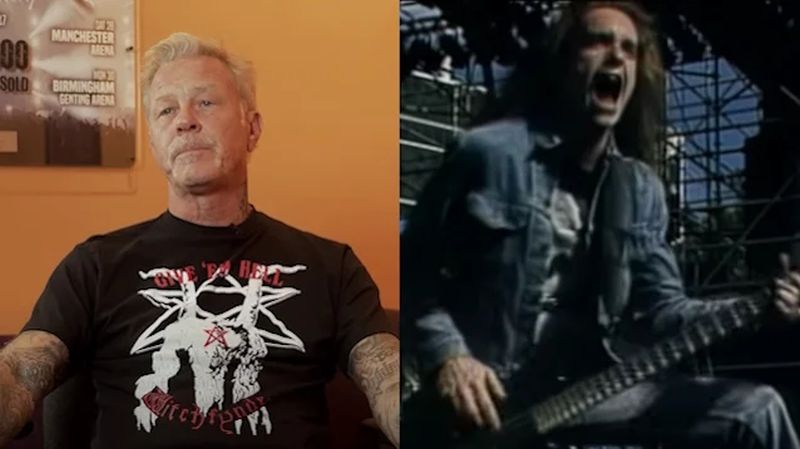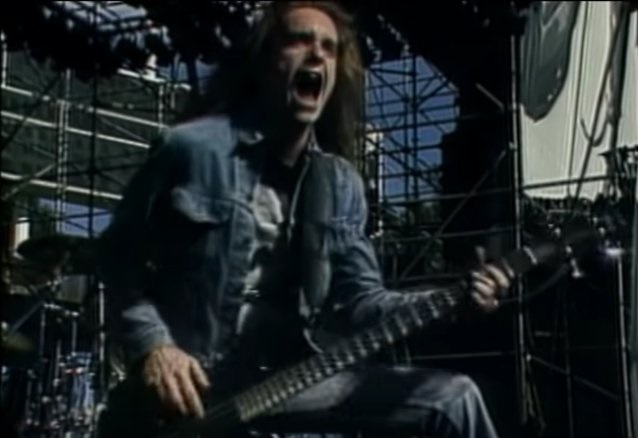METALLICA's JAMES HETFIELD still feels CLIFF BURTON's influence in his songwriting: “he lives in all of us”

30-09-2024
During an appearance on the latest episode of “The Metallica Report”, the podcast offering weekly insider updates on all things METALLICA, METALLICA frontman James Hetfield was asked if feels the influence of the band’s late bassist Cliff Burton in his writing. James responded: “Absolutely. Cliff still lives in all of us. The way he lives in me is I get to channel, you know, ‘Cliff, what would be really cool right here?’ And I do — I do hold him in such high regard that I ask for his help still. And I challenge myself, ‘Would Cliff like this?’ That, to me, is a pretty high standard. We already have high standards for ourselves, but you know, if I could impress Cliff, it was a good day.”
Cliff was asked to join METALLICA in 1982 after the band saw him perform with his group at the time, TRAUMA.
The bassist was not willing to move to Los Angeles, where METALLICA was based, so they decided to move to the San Francisco area so that he would join.
Burton played on METALLICA‘s first three studio albums — “Kill ‘Em All”, “Ride The Lightning” and “Master Of Puppets” — and co-wrote classic songs like “Ride The Lightning”, “For Whom The Bell Tolls”, “Fade To Black”, “Creeping Death” and “Master Of Puppets”.
His life was tragically cut short at the age of 24 in a tour bus crash on September 27, 1986 in Sweden.
Burton‘s initial replacement in the group was Jason Newsted, who stayed in the lineup until 2001. Robert Trujillo joined in 2003 and remains in the band to this day.
February 10, 2018 was proclaimed “Cliff Burton Day” by Alameda County supervisors. The late METALLICA bassist would have turned 56 years old on that date had he lived.
Back in 2016, METALLICA drummer Lars Ulrich spoke to Seattle’s KISW 99.9 radio station about Burton‘s tragic loss when METALLICA‘s tour bus skidded on ice while the group was on tour in Scandinavia and Cliff was thrown out the window and crushed. Lars said: “We were so shocked and stunned that we didn’t know what hit us. And, like most, I guess, kids in their early 20s who get ambushed with that type of thing, we jumped into a bottle of, in this case, vodka, for me, and stayed in there for quite some time. We weren’t mature enough or seasoned in life enough to know how to deal with this other than just to sort of, basically, almost hide behind the alcohol and compartmentalized it. So the next few months were very difficult, and it was crazy, but we just put the blinders on and started auditioning bass players. And we knew in our hearts that Cliff would be the first one to kick us in the ass and tell us to keep going, if he could see us mope. And so there was no moping; we just kept going the best we knew how to.”
METALLICA frontman James Hetfield was asked in an interview with TeamRock what he thinks Burton might have thought about the drastic changes in its look and sound that METALLICA made through the 1990s and early 2000s with albums like “Load”, “Reload” and “St. Anger”. Hetfield replied: “Well, I certainly would have thought there would have been some resistance, for sure. I think the ‘Black Album’ was a great album and I appreciate the fact that we did have the balls to do that… I would certainly think that the ‘Load’ and ‘Reload’ (era), I would have had an ally that was very against it all — the reinvention or the U2 version of METALLICA.”
Asked if Hetfield was personally comfortable with the more “alternative” image and music METALLICA made on those albums, the singer/guitarist replied: “No, no, not at all. There’s some great, great songs on there but my opinion is that all of the imagery and stuff like that was not necessary. And the amount of songs that were written was… it diluted the potency of the poison of METALLICA. And I think Cliff would have agreed with that.”
Burton‘s huge talent and achievements were chronicled in book form with the 2009 global publication of “To Live Is To Die: The Life And Death Of Metallica’s Cliff Burton”, written by U.K.-based author Joel McIver and published by Jawbone Press. The foreword was provided by METALLICA guitarist Kirk Hammett.

Social media



